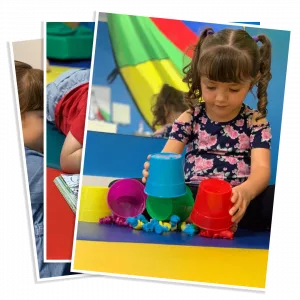Early Intervention
Children develop at their own pace. Some children walk and talk early or on time, but others are delayed in learning age-appropriate skills, like speech. If you have any concerns about your child’s speech, motor or cognitive development, the earlier you seek the better outcome it is for your child. Speech-language pathologists and occupational therapists help your child develop skills including:
- cognitive skills (e.g., thinking, learning, problem-solving)
- communication skills (e.g., gesturing, talking, listening, understanding)
- physical and sensory skills (e.g., crawling, walking, climbing, seeing, hearing)
- social–emotional skills (e.g., playing, understanding feelings, making friends)
- adaptive or self-help skills (e.g., eating, bathing, dressing).

Early intervention is different for each child and family depending on your child’s needs and your family’s priorities. Early speech, language, and occupational intervention can help children be more successful with reading, writing, schoolwork, and interpersonal relationships.
A lot happens developmentally in the first few years of life and the most important step is to START EARLY!
(Source: ASHA Research)
For a brief summary on developmental milestones for ages birth through 5 years, please review our Developmental Milestones.
For information on how to get started with a free 10-15 minute screening or to begin the process in receiving an evaluation and therapy services, please contact us at (786) 717-5649.
If you’re interested in additional ways to help support your child’s development, we encourage you to review our Specialized Programs which include our Exceptional Camp.

Did you know?
- Approximately 19 percent of children between the ages of two and seven demonstrate a language delay.
- The prevalence of speech sound disorders in young children is 8-9%. By the first grade, roughly 5% of children have noticeable speech disorders; the majority of these speech disorders have no known cause.
- It is estimated that more than 3 million Americans stutter.
- It is estimated that approximately 80,000 individuals acquire aphasia each year.
- Incidence of childhood stuttering is highest between a child’s second and fourth birthdays, ultimately affecting 4% to 5% of the population.
- Case histories often reveal a positive family history of communication disorders. Between 28% and 60% of children with a speech and language deficit have a sibling and/or parent who is also affected.
Source: ASHA Research
Play Skills
Play lets children develop their creativity, imagination, dexterity, cognitive, and emotional skills. Play is a very important element to healthy brain development. Appropriate play skills at an early age encourage language and motor development, as well as, interaction and engagement with the world around them. It is through play that children at a very early age engage and interact in the world around them.
Onlooker Play
Age
Any
Definition
Children watching others during play and may be reluctant to join or may not know how to play
Example
2 children are playing on a slide, while a 3rd child is standing by watching them
Solitary Play
Age
>2 years old
Definition
Children playing by themselves without interactions with other children
Example
A child playing on their own sorting and stacking nesting cups
Parallel Play
Age
2-3 years old
Definition
Children playing alongside each other, in similar activities, without obvious communication or interaction
Example
2 or more children playing with blocks near each other but not talking with each other
Associative Play
Age
3.5-4.5 years old
Definition
Children participating in similar or identical activities without formal organization or a definite goal
Example
2 or more children playing with blocks building the same thing, talking with each other but not working together to create something
Cooperative Play
Age
4-5 years old
Definition
Solving a problem by working together to achieve a common goal
Example
2 or more children are playing with blocks building the same thing
If you’re in doubt about whether your child is or is not meeting their developmental milestones or age-appropriate play skills, ask us for a free 10-15 minute speech and occupational screening or ask us about the evaluation process for our speech and occupational therapy services.
Onlooker Play
Age
Any
Definition
Children watching others during play and may be reluctant to join or may not know how to play
Example
2 children are playing on a slide, while a 3rd child is standing by watching them
Solitary Play
Age
> 2 years old
Definition
Children playing by themselves without interactions with other children
Example
A child playing on their own sorting and stacking nesting cups
Parallel Play
Age
2-3 years old
Definition
Children playing alongside each other, in similar activities, without obvious communication or interaction
Example
2 or more children playing with blocks near each other but not talking with each other
Associative Play
Age
3.5-4.5 years old
Definition
Children participating in similar or identical activities without formal organization or a definite goal
Example
2 or more children playing with blocks building the same thing, talking with each other but not working together to create something
Cooperative Play
Age
4-5 years old
Definition
Solving a problem by working together to achieve a common goal
Example
2 or more children are playing with blocks building the same thing
If you’re in doubt about whether your child is or is not meeting their developmental milestones or age-appropriate play skills, ask us for a free 10-15 minute speech and occupational screening or ask us about the evaluation process for our speech and occupational therapy services.
Contact Us
If you have any questions about speech therapy in Miami or Doral, Florida or would like to book an appointment for speech therapy, please call Exceptional Speech Therapy at 786.717.5649 or fill out the form below.
Myofunctional Therapy for Speech and Swallowing Disorders
Speech and swallowing disorders can significantly impact an individual's quality of life, affecting their ability to communicate effectively and enjoy meals without difficulty. While traditional therapies have long been used to address these challenges, a relatively newer approach, myofunctional therapy, [...]
What is “Scripting”? : A Guide for Parents of Kids with Autism Spectrum Disorder
Scripts are a superpower for kids with Autism Spectrum Disorder (ASD)! Let's dive into the wonderful world of scripting, what it is, and how parents can navigate this unique communication style with ease. What is Scripting? Imagine having your own [...]
5 Creative Ways to Wean Your Child off the Pacifier
Ah, the beloved pacifier – the magical tool that soothes fussy babies and saves parents from countless sleepless nights. But, there comes a time when the binky must go, as it can impact a child's oral development, sleep habits, and [...]


